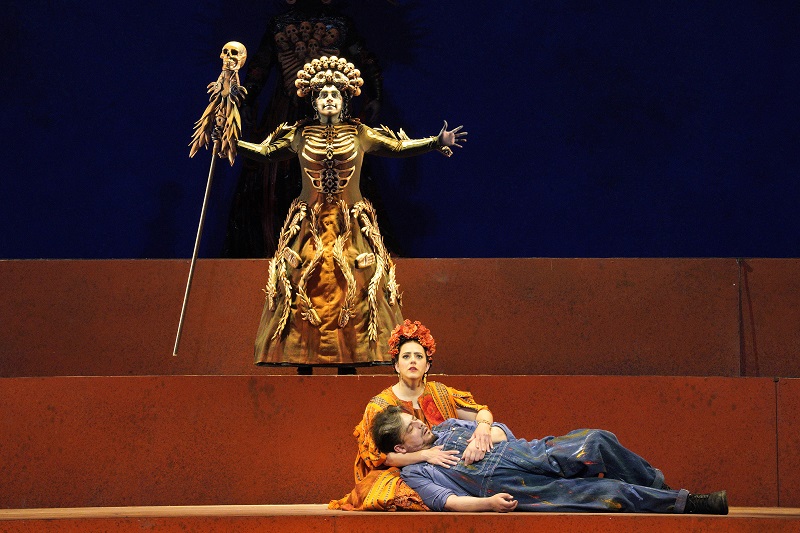
THE OPERA ON FRIDA KAHLO, WHO HAD BEEN THROUGH HELL
The S.F. opera house was like a trip to Mexico City, starting with the lobby and numerous patrons in flower-capped formals, thanks to a contingent that had never been to opera before. Then came the new work in Spanish, and a fantasy based on the real-life couple Frida Kahlo and Diego Rivera, both of them art-world, New-World luminaries—-their loves, their spats, their splits, their reconciliation. For the 50-year-old composer with a strong lyrical bent, this was a promising initial venture into music theater, auguring well for the future.
It was historic for the 100-year-old S.F. Opera itself June 13, weighing in with its very first sung in Spanish, as well as the first woman composer, Gabriela Lena Frank, in her new opera “The Last Dream of Diego and Frida” (El ultimo sueño de Frida y Diego). Supertitles obligingly were featured in both English and Spanish throughout. Olé!
And, as befits the story of two artists, the entire opera was a stunning feast for the eyes. The Day of the Dead decorations and lights festooning the cheeriest cemetery you’ll ever see was glorious, thanks to Jorge Ballina’s bright and uplifting set design. At one point the sets smoothly and wondrously shifted the action from a huge blank mural wall, challenging the painter Diego, to suddenly producing a detailed and painted park-fair scene full of people strolling, out of nowhere—sheer stage magic. Visually, this was a nonpareil achievement. Ballina also created instant Kahlo “portraits” by dropping huge frames from the flies to encase elegantly costumed actors on stage without misfires.
Think of ”Sueño” as a modern Hispanic baroque opera, devoid of vocal ensembles. If you were anticipating mariachi trumpets, and a bevy of la raspa dancers in folclórico style, this was not your show. Frank instead delivered a massive amount of ingratiating choral singing on and off the stage, along with an augmented marimba section in the pit orchestra.
Frank’s music communicates effortlessly. Some of her Underworld effects are eerie in the finale, sounding like clashing flute tones. Yet at the June 13 opener you waited and waited for music to take off and fly skyward. The Frank rockets remained mostly tethered.
Taking the ancient “Orpheus and Euridice” myth as a starting point, this tale was constructed around the Mexican Day of the Dead, its traditions and its visions. It featured a detailed but subdued musical score for Frida to emerge from the Underworld and rejoin her ex-husband on Earth. They reconcile but abruptly perish as per the weird rules of the revival game set down by the Underworld’s apparitions manager Catrina (forcefully sung by the soprano with the dazzling lower range, Yaritza Véliz). She manipulated the dead’s visits to the living and their forced return.
For the title roles, you want the caballos potentes to pull your coche up the mountain. For the true lead role, Frida, you seek some 21st-century counterpart to Jessye Norman, Lorraine Hunt or Teresa Berganza. As Frida, mezzo Daniela Mack fell short of the potential with a voice that never fully opened up like a Mexican rose in springtime.
Baritone Alfredo Daza (Diego) projected stirring tones, though his role was hemmed in by the feeble old age, showing no flash of his great personality. A welcome surprise was the silky-smooth countertenor Jake Ingbar playing a gay Greta Garbo impersonator, an interesting dramatic touch in Nilo Cruz’s libretto.
Lorena Maza directed the predominantly tableau scenes. Roberto Kalb ably conducted the varied forces near and far.
The petite Berkeley-born Gabriela Lena Frank, 50, is a true one-woman United Nations. She is American of Lithuanian Jewish heritage as well as Peruvian of Chinese descent.
OPERA NOTES—How widely can this opera be shown in the US? The Garbo impersonation by a male is frequently taboo. Legislation against “drag shows” has been introduced this year in more than 20 states. Sorry, Greta….This is an opera that, next time, demands to be played close to the November Day of the Dead, when it can make maximum appeal to the Mexican-American community.
G.L. FRANK’S NEW OPERA “El último sueño de Frida y Diego,” at S.F. Opera, in Spanish. Opera House, San Francisco, till June 30. Two hours and a quarter; one intermission. For info: (415) 864-3330, or go online, www.sfopera.com.